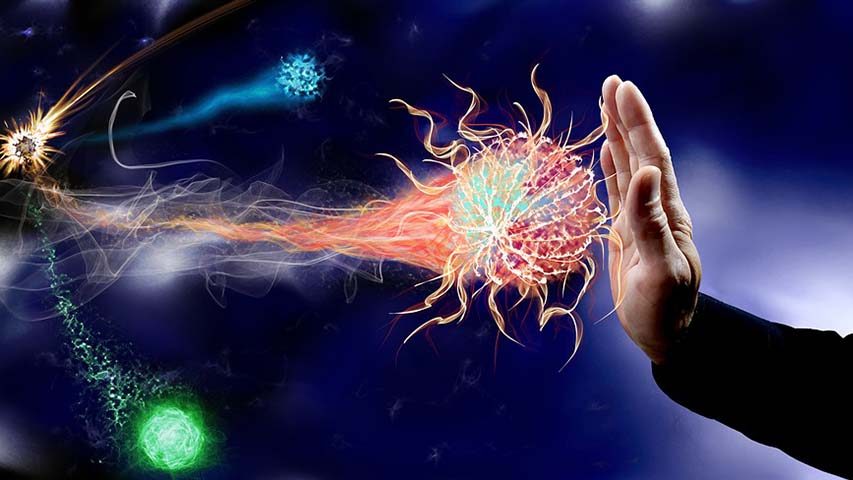- Have any questions? Contact us!
- info@dr-rath-foundation.org

Over 70 Thousand Children In Britain On Antidepressants
July 25, 2018
British Doctors Lack Transparency Over Pharma Industry Payments
July 27, 2018Natural Treatment Of Immunodeficiency Disorders

Immunodeficiency disorders are a group of conditions in which the body’s immune system is either severely weakened or not functioning at all. In some cases, patients are born with immunodeficiency disorders. In others, however, such as in AIDS or certain cancers, the disorder is acquired later in life. Acquired immunodeficiency disorders are the most common type.
What is the immune system?
The immune system is the body’s defense against infectious organisms and other harmful influences from the environment. It primarily consists of the tonsils, lymph nodes, thymus, spleen, and bone marrow.
The main tasks of the immune system are to recognize invaders such as viruses, bacteria, fungi or parasites; neutralize them; and remove them from the body. The immune system also has to recognize and neutralize harmful substances from the environment, and fight against the body’s own cells when they present a threat to it, such in cancer.
Symptoms of immunodeficiency disorders
The symptoms of immunodeficiency disorders include the following:
| » Repeated occurrence of pneumonia, bronchitis, sinus infections, ear infections, meningitis, or other infections |
| » Inflammation and infection of internal organs |
| » Blood disorders, such as low platelet counts or anemia |
| » Autoimmune disorders, such as lupus or rheumatoid arthritis |
Diagnosis of immunodeficiency disorders
If your doctor suspects you have an immunodeficiency disorder, he or she will run a variety of different laboratory tests. These may include checking your white blood cell count, your T cell count, and your immunoglobulin levels.
Conventional treatment of immunodeficiency disorders
Conventional treatment for immunodeficiency disorders depends on the specific symptoms. Doctors will typically prescribe drugs such as antibiotics and immunoglobulin therapies; antivirals such as amantadine or acyclovir; or a protein drug called interferon. As with all pharmaceutical approaches, however, such treatments inevitably cause side effects.
In a worst-case scenario, if your bone marrow isn’t producing sufficient white blood cells, your doctor might even suggest a bone marrow transplant. Ultimately, however, towards properly correcting immunodeficiency disorders, none of these approaches provide the answer. In order to treat the problem successfully, merely addressing the symptoms is not enough.
The Cellular Medicine approach to enhancing the immune system – your body’s natural defense
The Cellular Medicine approach to immunodeficiency disorders focuses on strengthening the immune system through providing an optimum supply of specific micronutrients. In addition to following Dr. Rath’s Basic Cellular Health Recommendations, taking higher doses of the following micronutrients is particularly beneficial:
| VITAMIN C – Vitamin C has proven beneficial effects on immune function. |
| VITAMIN A – Studies show that having a sufficient amount of vitamin A is essential for immunity. |
| VITAMIN E – Vitamin E is an important micronutrient for maintaining the immune system. |
| VITAMIN B6 – Vitamin B6 has been shown to increase immune responses, even in critically ill patients. |
| VITAMIN B12 – Vitamin B12 plays a key role in cellular immunity. |
| FOLIC ACID – Folic acid is proven to assist normal immune cell function. |
| IRON – A lack of iron negatively affects immune response. |
| CALCIUM – A properly balanced intake of calcium is crucial for a well-functioning immune system. |
| MAGNESIUM – Research shows that magnesium participates in immune responses in numerous ways. |
General advice for improving immunity
Eat a balanced whole foods diet with plenty of leafy green vegetables, fruits, nuts, seeds and grains, and make sure to take regular exercise. Eating a vitamin-rich diet and staying active has proven benefits for the body`s immune system.
And don’t forget to get plenty of sleep. A healthy sleeping pattern is essential for a strong immune system. Try to avoid getting overstressed too. During periods of stress the body releases cortisol, adrenaline, and other hormones. If you become chronically stressed, a high production of these substances can be harmful to the immune system.
If you would like further information on tackling immunodeficiency disorders using natural approaches, please feel free to contact us.



